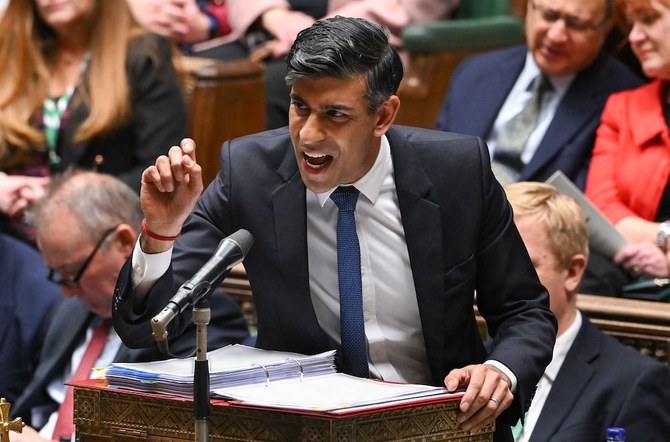Andrew Hammond
Europe’s migration challenges have made headlines worldwide recently, with 2024 US Republican presidential candidate Ron DeSantis even claiming that the continent is “committing suicide” with its policies. However, the extreme language of DeSantis perhaps says as much about his flailing campaign’s search for media attention as it does Europe’s predicament. The issue is more complex than some political polemicists like DeSantis acknowledge, not least because much of Europe, including G7 nations Italy and Germany, need more workers.
However, there is no denying that this issue is right back at the top of the political agenda. This was shown yet again this week, with simultaneous high drama in the French National Assembly and the UK House of Commons. On Monday, the French National Assembly rejected President Emmanuel Macron’s immigration bill, which would have provided new legal tools to remove thousands of people who have entered the country via illegal routes, while allowing economic migrants the opportunity to work more easily. The far-right National Rally, led by the country’s possible next president Marine Le Pen, joined forces with left-wing legislators to defeat the bill.
This huge loss has destabilized Macron’s presidency. And it came soon after similar political turmoil in Europe, including the collapse of the last Dutch government after it could not agree on new restrictions on immigration. It was in this context that UK Prime Minister Rishi Sunak on Tuesday faced the most important parliamentary vote of his premiership. The focal point was his plan to send a cross-section of asylum seekers to Rwanda. The vote capped an extraordinary few days, which saw internal Conservative Party battles play out in ways perhaps not seen since the aftermath of the 2016 Brexit referendum.
While Sunak won the vote, he feared defeat. One indication of this was the fact that Climate Minister Graham Stuart left the COP28 climate change conference in Dubai early so that he could fly to London to support the government. Although Sunak prevailed – after “pulling out all the stops,” according to rebelling members of his own party – what is remarkable is how much of a mess his government found itself in over one of its flagship policies. No UK government has been defeated on a bill’s second reading (a procedural step in the passage of legislation) since 1986. So, a defeat would have been incredible.
The danger for Sunak now is that he knows this could prove to be a Pyrrhic victory that merely kicks the can down the road. This is because his win on Tuesday came despite significant reservations about the legislation from a large minority of Conservative lawmakers, including about two dozen who abstained on Tuesday in anticipation of amendments in 2024.
The Brexiteers on the right of the party are concerned that the Conservatives could be outflanked by political maverick Nigel Farage, who has said that the Rwanda bill is “pathetic.” The successor organization of Farage’s UK Independence Party is the right-wing Reform UK, which advocates “net-zero immigration” and is now polling at just under 10 percent in many opinion surveys.
One reason this political balancing act is so difficult for Sunak is that any shift to the right to toughen the bill may well trigger a backlash among more moderate Conservatives in the “One Nation” group. So, the potential failure of the legislation could just have been delayed, rather than averted entirely, by Tuesday’s vote.
Looking beyond the growing political challenges for Sunak in holding his party together before the next election, there is also an issue that many voters would argue is much more important: effective UK policy. There remain significant concerns about the Rwanda plan, even before a single asylum seeker has been sent to the African country. The scheme is already forecast to cost some £400 million ($506 million) by 2026.
The new legislation, opposed by all key opposition parties in the House of Commons, was introduced after the UK Supreme Court blocked Sunak’s previous Rwanda plan. That policy, first announced in April 2022, is at the core of the new plan – that is, to try to deter people from crossing from continental Europe to the UK in small boats by sending some asylum seekers to Rwanda.
The Supreme Court struck it off over doubts as to whether Rwanda is a safe country for asylum seekers. So, the government’s latest bill aims to try to guarantee the safety of asylum seekers, including a new treaty with the African nation. However, even if the Rwanda legislation ultimately becomes law, it is possible that not a single asylum seeker will be sent to Rwanda before the next general election, which is expected in 2024. Labour Leader Keir Starmer confirmed on Tuesday that he would repeal the bill, which he calls an expensive “gimmick,” if his party comes to power.
Labour’s alternative plan includes redirecting the money into better enforcement and bolstering security agreements with other countries. Starmer also wants more to be done to reduce the backlog of asylum claims by processing them faster, plus removing people to the country they came from should their claims be rejected. Critics of Sunak’s bill continue to question the morality and legality of the Rwanda plan, including whether it is compatible with the European Court of Human Rights. They argue it does nothing to address the Supreme Court’s concerns about Rwanda and sets a precedent about removing the jurisdiction of UK courts to consider the issue. The British example highlights the complexities facing European governments as they seek to tackle migration and asylum issues. With public confidence in the system falling, politicians must now prioritize effective and just schemes over political gambits that are costly and inefficient.







